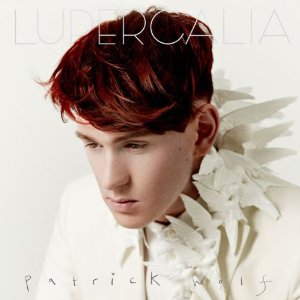There’s been a dichotomy at the heart of Patrick Wolf ever since he expressed the desire, on his first album, to live a life with "two dogs, two cats, a big kitchen and a welcome mat". Back then this plea for domesticity seemed at odds with the primal teenage yowls of despair and identity crisis that made up the rest of Lycanthropy, songs like ‘The Childcatcher’ and ‘Bloodbeat’, where he howled that he "was once a boy/ until I cut my penis off".
It also seemed at odds with the boy on the cusp of manhood who ran away to Cornwall on Wind In The Wires. That second album showed a maturating of sound and songwriting but yet more identity crisis, the self-portrait of a boy who flees, who craves escapism, not security. The Magic Position, with its overt flamboyance, fairy tales of magpies and bluebells, and paeans to running away (yet again, but this time together, and on bicycles), also seemed far from the homely bliss he craved.
And then there was The Bachelor; the lonely cry, and chest-beating drama, of the young man who cannot commit, who suspects he is broken, destructive, impulsive; who hollers at the moon for fear that he will die alone in bed, that he will never know love, that he will never settle, that he will forever be trapped indulging dark desires that shatter dreams. His fourth record seemed to be an exorcism of his demons through the act of embracing them, like throwing high-octane fuel on a fire to try and explode it out.
Lupercalia, Patrick Wolf’s fifth album since 2003, was originally to be called The Conqueror, and was to be a partner to The Bachelor: the yin to its yang, the white to its black, the heart and blood to its offal and bile. As is often the case with Patrick Wolf, though, the initially stated aim changed somewhere, and The Conqueror became Lupercalia, named after an ancient festival of love that falls across, but historically predates, Valentine’s Day.
Lupercalia is a more complex, a more worthwhile, and a more emotionally strong and resonant album as a result; instead of being a pure, naïve celebration of love it is instead a narrative of the course of love. It starts with four songs that are caught in the flush of infinite hope, the rush and push and excitement of a new romance. ‘The City’, ‘House’, ‘Bermondsey Street’, and ‘The Future’ are invulnerable, without shame; they brandish major-key surges and brass fanfares and endless optimism and lyrics about feeling on top of the world without irony. There is a danger that some people will hear ‘The City’ and it will make them uncomfortable, perhaps even make them squirm the way that one squirms when you see a young couple kiss each other a little too passionately in publics. They might take umbrage at the cheesiness, at the cliché, at the mutual romantic solipsism of it all. Other people, though, will remember how that feels, and smile deliriously.
After this effervescent opening quartet Lupercalia loses a little of its sheen of heady love and lust, just as you might expect to happen in a relationship. A hint of doubt creeps in with ‘Armistice’, tempos slow, the sound palette moves from ebullient to ruminative. The lyrics move from rising on the balls of your feet to kiss in the middle of the street to fearing children with sharpened knives, to fighting foxes, to closing your doors to keep out the world.
‘Time Of My Life’, meanwhile, is possibly the most glorious pop song Patrick has penned. It’s touched with both joy and melancholy before the second half of the album continues to plot the more subdued course begun by ‘Armistice’. ‘The Days’ and ‘Slow Motion’ reconcile the eagerness of that opening barrage with a grounded realism. Sonically they feel organic, sophisticated, meshing together the electronic flair and acoustic upbringing that Patrick has been bringing together for his whole career into a seamless whole. There’s no sense of folk here, or jarring laptop experimentation; just the sound of beautiful, sleek, meticulously produced modern pop. Penultimate track Together uses a Donna Summer disco pulse and euro-house sheen are overlaid by Patrick’s theatrical vocals and yet further lyrical maturation; "I can do this alone" he boasts, "but we could do it so much better, together," as strings and synthesizers pile up.
I’m not sure what people will make of Lupercalia; as usual I suspect reactions will vary depending largely on what you want from Patrick Wolf as an artist: the caterwauling, beat-mashing adolescent is long gone, the mythology and imagery stripped away, the hedonism subsumed. What we’re left with is Patrick, naked, content, at points willfully delirious, at others melancholy, but no longer so destructive. Lupercalia could see him break into a mainstream audience, but it could also disenfranchise subsets of the ever-fanatical wolf pack. If nothing else it shows that, on his finest album, Patrick Wolf has become an absolutely superlative pop songwriter. His tumultuous story so far suggests he will not be becalmed for long, but right now it’s a glorious place for him to be.


